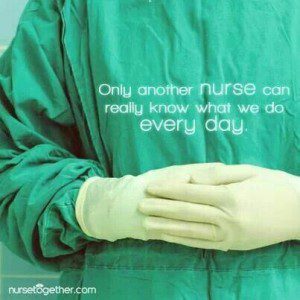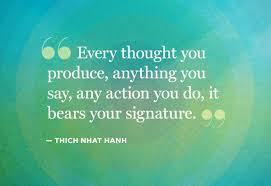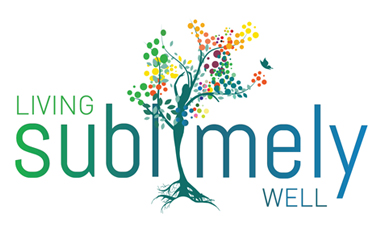I recently saw this photo on social media (among many, for sure) in response to the events last month during the week of September 14th. This was the day that the comments were made on the daytime television program about stethoscopes and scrubs.
 Once this photo was posted, there was a whole discussion that followed. Again, one discussion of the thousands that were occurring. The nurses responding to this image said things like:
Once this photo was posted, there was a whole discussion that followed. Again, one discussion of the thousands that were occurring. The nurses responding to this image said things like:
- “Do we want this to be true? In the light of recent events, don’t we want to articulate what we do?”
- “We can educate people, but until they walk a day in our shoes they will never know what nurses do.”
- “The word ‘nurse’ alone brings up many emotions and feelings that one just can’t explain.”
I purposefully stayed out of all of this back-and-forth on social media. One might think my non-response was an indication that I did not care. To the contrary. In fact, I made this conscious choice (and believe me, it was an effort as I was tempted to dive right in) to observe things from a distance.
Why is that?
Well, a lot of what I read on social media was highly emotional. Posts filled with anger, resentment, and pain. (Of note, I did find this one blog post that was more educational in nature.) Sure, the words that were voiced from the celebrity on TV were poorly chosen, however, I am not sure they were meant to harm. I simply feel that it was a mistake.
This brings me to the point of this post today- how we regulate our reactions. I’m not saying we need to monitor everything we think, feel, speak and do. I am encouraging us to take pause to reflect on what we write and speak before we put it out there.
I have this quote on my refrigerator from Thich Nhat Hanh:

When we speak, write or do something… we give the experience energy. It creates a snowball effect. The more we react, and feed off of each other’s words and actions, the greater it gets. To me, this entire experience that occurred when the TV show host made a comment about nursing created an opportunity.
Instead of responding with anger, we as nurses were given the gift of education. We can take what was said and use it as the impetus for great change. If we simply take the time to pause, let our emotions settle and reflect on the bigger picture- we can creating lasting shifts.
[Tweet “Here Are a Few Ways Nurses Could Eradicate Mis-Perceptions”]
- Educate People. As I shared above, if there was a mistake made (whether it be in words or actions), instead of jumping down somebody’s throat for this oversight we can take the opportunity to educate them on what we do. It’s no different than if a nurse made a medication error. We would want to learn from that experience in order to change it so that it didn’t happen again.
- Write Letters. Sending response letters to local media, news and political figures is a great way to advocate our voice. We can use situations like this to explain how important nursing is and describe just how necessary the role is. This is a wonderful opportunity to have our profession at the table with important decision makers of our world.
- Offer Interviews. Rather than playing small on social media, we could offer to share our experiences with the public via audio and/or video interviews. Find a way to get interviewed on a radio show or podcast; contact the local television stations where you live. It’s an excellent opportunity to invite more people to join us in this awesome nursing profession.
- Host Shared Experiences. I think it would be really neat to get some folks to come to the places where we work (and not just in the hospital, mind you) to see what nurses do each day. A lot of the reactions on social media were about injections and pills, however I know nurses that do not work in the hospital setting and do much more than give out medications all day long. We use evidence in our practice; we draft strategic plans and termed goals; we sit on shared councils and impact community decisions.
- Celebrate Nursing. One really cool idea that I have had from all of this is asking a daytime television show if they’d host a nurse-a-day. You know, like have them on the show and interview them around what they do. We could even do something like this during National Nurse’s Week to celebrate the pride of our profession. Really, when you look for opportunity, the sky’s the limit!
I’d love to hear what I missed. What would you add to the list above? How do you think you might go about with a proactive response that turns challenges into opportunities? Share a comment below and thanks for reading!
About the Author: As a keynote speaker, bestselling author and virtual conference host, Elizabeth partners with hospitals, organizations, associations, and nursing groups to help transform the field of nursing from the inside out. As the bestselling author of ‘Nursing from Within‘, Elizabeth guides nurses and nursing students to a change in perspective, helping them make the inner shift needed to better maneuver the sometimes challenging realities of being a caregiver.

Agree with you, btw, that quote from Thich Nhat Hanh is my favorite:)
Awesome! Thanks, Lilly.